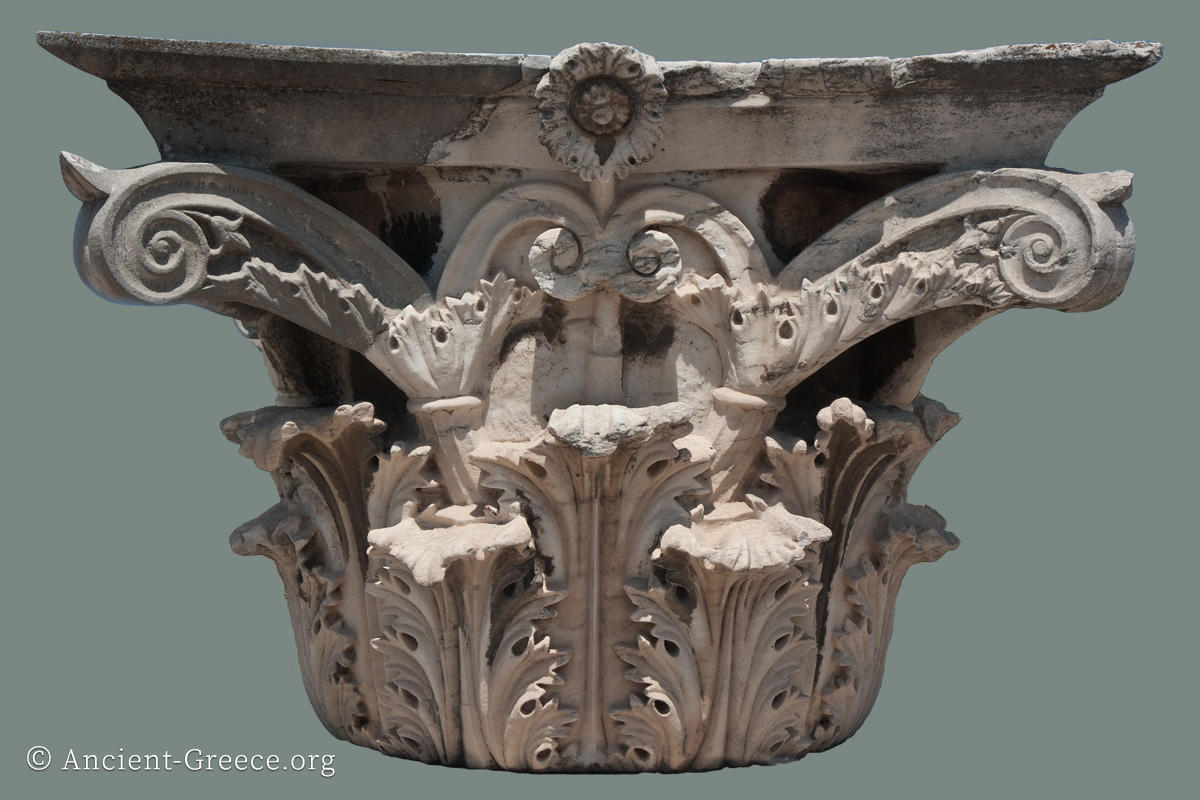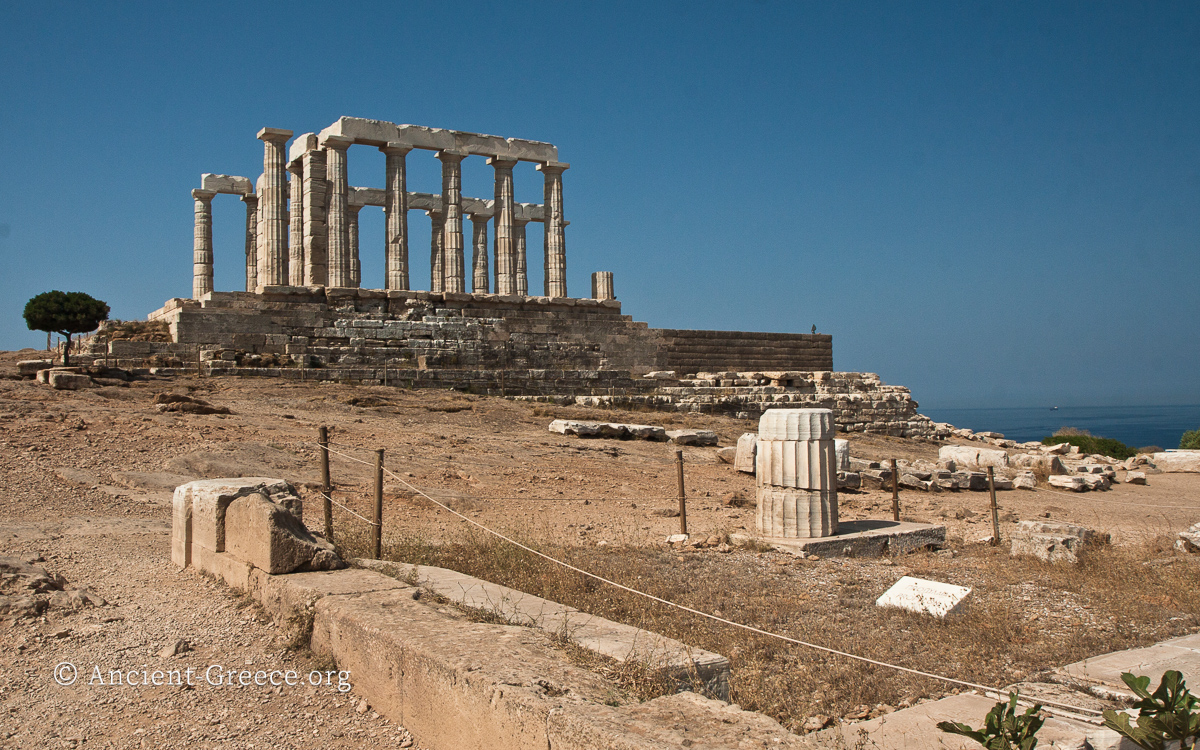
On this page:
The ancient Classical and Hellenistic eras of Greece, between the 5th and the 1st century BCE, are undoubtedly the most splendid. They left behind an enduring heritage of ideas, concepts, and art that have been influential for centuries around the globe.
The two millennia that preceded the 5th century were no less important, being host to several enduring civilizations in the Aegean, Crete, and the mainland.
Ancient Greek civilization is known more for its lasting contributions and achievements in philosophy, politics, science, medicine, language, literature, art and architecture, than it is known for its conquests or wealth.
The earliest written form of Greek comes in the form of Linear B tablets found in the Palace of Knossos in Crete, and are dated to 1400 – 1370 BCE. (Κριτζάς, 12:55) The tablets also contain the names of Greek Olympia gods like Zeus, Poseidon, Ares, Athena, Apollo, and more.
Influence
The extend of Hellenic civilizations’ influence increased with each historical era.
During the Bronze Age (3000 – 1100 BCE), the Cycladic, Helladic (later “Mycenaean“), and Minoan cultures flourished in the Aegean Sea and the coasts of mainland Greece and Anatolia, in close contact with adjacent contemporary cultures like the Egyptians.
In the subsequent Archaic era (700 – 480 BCE) the spread of Greek colonies facilitated commerce and the exchange of ideas across the Mediterranean and Black sea coasts.
The emphasis and organization of political life around the individual citizen’s participation in the direct Democracy of Classical (480 – 323 BCE) Athens among other cities, eventually morphed into one of the foundational elements of what is known as “European”, or “Western” civilization.
During the subsequent Hellenistic Era (323 – 146 BCE) after the death of Alexander the Great, Greek culture expanded its influence across Egypt, Anatolia, the Near East, as far as today’s western India and northern Afghanistan. This was a time of direct contact between Greek, Indian, and Chinese civilizations.
After the Hellenistic kingdoms were absorbed into the Roman empire starting in 146 BCE, Greek language, literature, philosophy, science, medicine, art and architecture spread across the majority of the European continent, Britain, North Africa, Asia Minor, and the Levant.
Greek culture remained influential for centuries after the fall of Rome, continuing to inspire Byzantine, Arab, and European scholastic cycles deep into the Middle Ages and beyond, with much of it surviving to our day directly or in permutations.
Society and Politics

In time, Classical Greek ideals were engrained in the foundation of what we call “Western” or “European” civilization, most significant of which are the direct democracy of Ancient Greek city-states, and especially Athens, respect for the commonly agreed laws, individualism, emphasis on reason and logic, as well as market-based free trade economy.
Democracy (δημοκρατία) moved political power as close as possible to the individual citizen (usually adult male descendants of citizens of the city, with variations through time), irrespective of their socioeconomic status. It was a “direct democracy”, and was considered contemptible for citizens to abstain from the political process.
Among the Greeks, wherever democracy had taken root, the people would not rest content with the imposition of oligarchy but sought a return to popular rule.
Kagan, 144
Similarly, justice in Classical Greece was placed in the hands of the citizens. The concept of “trial by jury” was first developed in Ancient Greece in the 5th century BCE.
One of the main characteristics and enduring legacy of Classical culture was its tolerance for self-criticism. This tolerance’s intensity fluctuated trough time, as the death of Socrates indicates, but in the realm of ideas it was a fertile ground for philosophical growth.
Philosophy and Science
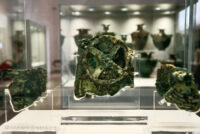
The writings of Ancient Greek philosophers, and especially of Plato and Aristotle influenced thinkers for over two thousand years. Plato’s ideas have been woven into the moral frameworks of European and Near East cultures and religions, while the teachings of Aristotle and Ptolemy remained the scientific norm for an equal amount of time.
Aristotle’s influence across philosophy and society for two millennia cannot be overstated. His work on logic influenced scholars into the 19th century. His formal logic theory and meta-theorems are considered the foundation of modern logic.
Aristotle is often referred to as the “father of physical sciences” due to his extensive contributions to the early understanding of natural phenomena and the physical world. He studied physics, linguistics, economics, politics, and psychology, developing influential theories on motion, elements, and cosmology. Many of his theorems are disproven today, but they heavily influenced scientific thought for centuries.
Scientific thinkers like Pythagoras, Euclid, Thales, Democritus, Archimedes, Ptolemy, and others systematized, innovated, expanded, and invented long-lasting knowledge and theories. Many of their mathematical and scientific discoveries are still relevant in the twenty first century.

Aristarchus of Samos (310 – 230 BCE) was the first to propose the heliocentric model of the universe, where the planets revolve around the sun. However, Claudius Ptolemy’s 1st c. CE “Planetary Hypothesis” with its geocentric universe was better known and adopted by western scientists until Copernicus proved the heliocentric model with optics and accurate measurements in 1543.
Hipparchus (190 – 120 BCE) is referred to as the “father of astronomy” because he developed precise methods to measure distances of celestial bodies using trigonometry, creating a catalogue of stars, and for discovering the precession of the equinoxes.
The Pythagorean theorem and Euclidean geometry are still taught in schools today. Democritus was first to hypothesize that the entire world is made of atoms (ἄτομος = indivisible) and void around 400 BCE.
Archimedes’ mathematical treatises and inventions had profound influence in mathematics and engineering. Eratosthenes (276 – 194 BCE) calculated the circumference of the earth within 2% or 16% of the actual circumference. He also calculated that there are 365 days in a year and that every fourth year there would be 366 days.
In medicine, Hippocrates (460 – 370 BCE) is considered the “father of medicine”, having paved the path for modern medicine with the use of prognosis, clinical observations, and the systematic categorization and study of deceases. Physicians around the globe today take the Hippocratic Oath, the earliest expression of medical ethics in the western world. Galen’s (129 – 216 BCE) medical research influenced the fields of anatomy, pathology, pharmacology, and neurology. While most of the ancient medical theories have been disproven, the use of a systematic methodology for treating deceases endured through centuries.
The Hippodamian Plan, the first city plan to arrange streets in right angles made by Hippodamus, is still used in urban planning today.
Language and Literature
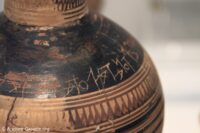
Greek is one of the most influential languages in the world.
Sometime between 950 and 750 BCE ancient Greeks introduced vowels to the Phoenician script to create the Greek alphabet. An early form of Greek alphabet from Euboea became the root of the Latin alphabet, which is used by about 35% of the world population today.
During the The Hellenistic Age (323-31 BCE), and deep into Roman and Byzantine times up to 1453 CE, Greek was the common language throughout the eastern Mediterranean Sea. Some of the most influential books in the world, like the Hebrew Bible and the books of the New Testament were written in Greek during the 1st and 2nd centuries CE.
The writers of Ancient Greece have produced a voluminous body of literature, poetry, and historical texts which have been studied by scholars across the globe for centuries. Notable examples are the epic poems of Homer, the poetry of Sappho, the tragedies of Aeschylus and Euripides, and the histories of Herodotus and Thucydides.
The ancient Greek language has remained influential to this day with much Greek vocabulary engrained in the Modern Greek and English languages.
The language’s dexterity in the construction of complex, compound, words allows for specificity, thus greek vocabulary has been a heavy contributor to today’s medical and scientific vocabularies. It did help that up to the 20th century scholars around Europe were well versed in Greek and Latin.
Art & Culture

Greek mythology has survived to our day in a wealth of rich, didactic, stories that find permutations in contemporary culture and popular media. Many celestial bodies, constellations and planets are named after Greek mythological characters.
Likewise, the art and architecture of ancient Greece has remained relevant and influential up to our time across the breadth of western society. The ancient Greek temple facade has become the trademark image of long-lasting, stable institutions (like banks and government) across the globe worthy of dedicated emojis (i.e. 🏛️🏦).
Classical aesthetic values resurfaced several times millennia after the end of Ancient Greece as a historical chapter. The 15th century Italian Renaissance was inspired in large part by the re-discovery of the ancient Greek ideas through text and art. Greek-inspired art enjoyed another revival during the Neo-Classical art and architecture movement in 18th century Europe.
Inspired by Egypt, Greek art began a long tradition of monumental sculpture in Europe that endures to our day. Greek sculpture canons for proportions along with its dedication to realism, and idealism, continue to be points of reference for figurative sculpture around the world. Ancient Greek motifs and patterns are ubiquitous in decorative styles in classical-era inspired interior design.
The Olympic Games were the most renown among several sanctuary festivals that took place in Ancient Greece. These festivals often included athletic, poetry, music, and drama competitions. The first Olympic Games were held in 776 BCE and the last in 393 CE. After their revival in Athens in 1896 CE, the Olympics became a global affair. They are now held every four years in a different country, with athletes from the entire globe competing in different athletic events.
The Birth of History
“History” is a discipline that was conceived and developed first in Ancient Greece.
Herodotus (484 – 425 BCE) is considered the Father of History, as he was the first who recorded events and human actions for the sole purpose of preserving them for future generations. The very first lines of his Histories read:
“Herodotus of Halicarnassus here displays his inquiry, so that human achievements may not become forgotten in time, and great and marvelous deeds – some displayed by Greeks, some by barbarians – may not be without their glory;”
(Herodotus, 3)
Being the first to attempt such a feat, Herodotus was not spared from harsh criticism for including in his Histories (written around 430 BCE), myths, legends, and outrageous tales.
Not much later than Herodotus, Thucydides (460 – 400 BCE) with his History of the Peloponnesian War put his own stamp on the discipline of History by attempting to present history in an “objective” way, and to emphasize correlations between human actions and events.
“I have written my work, not as an essay which is to win the applause of the moment, but as a possession for all time.”
(Thucydides, 16)
Their approach and methods of recording historical events became the guiding light for historians of the next two thousand years.
Ancient Greece Illustrated Map
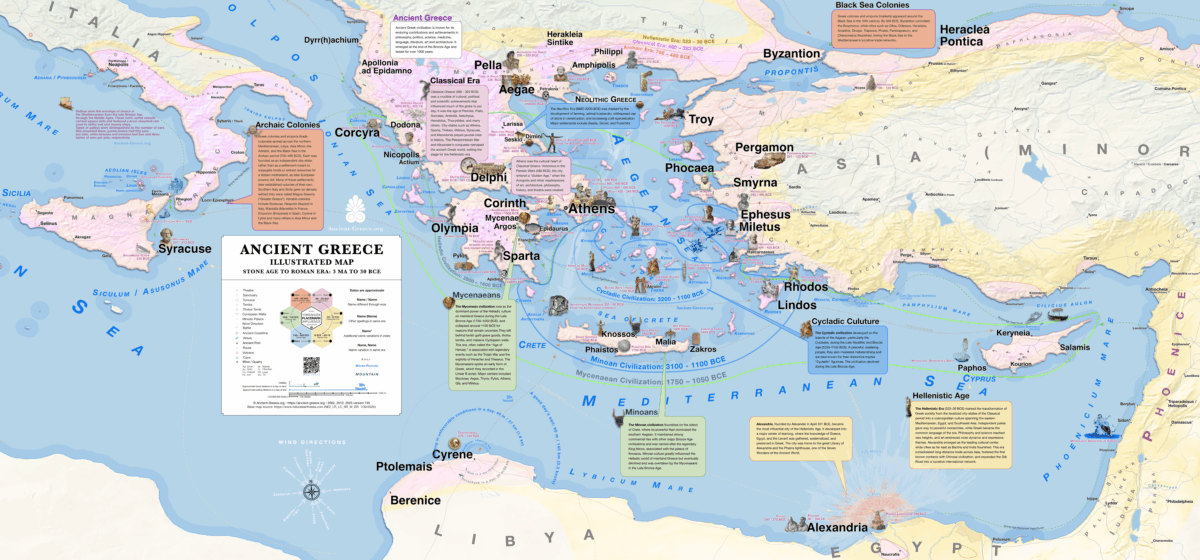
Chapters
This history of Ancient Greece is divided into the following chapters:
- Timeline
- Introduction
- Overview
- Geography
- Stone Age
- Bronze Age
- Dark Ages
- Archaic Era
- Classical Era
- Hellenistic Era
Related Pages
